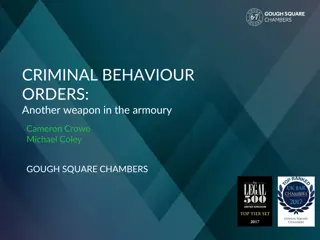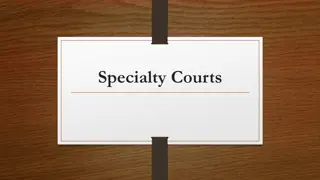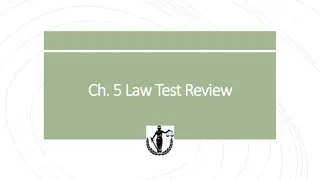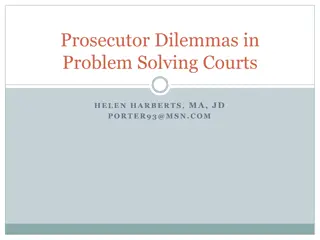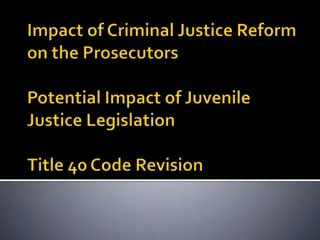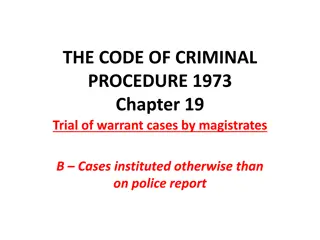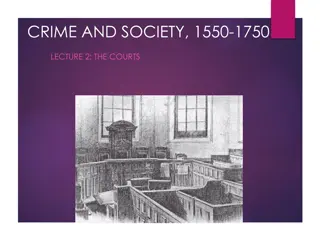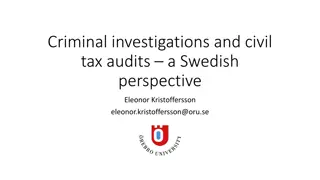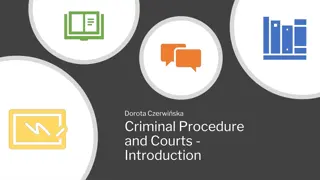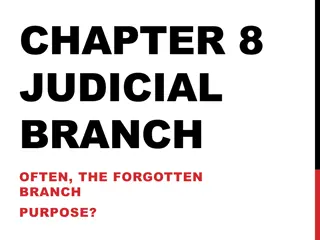Introduction to Criminal Procedure and Courts: Overview and Terminology
This piece provides an introduction to a course on Criminal Procedure and Courts, covering topics such as criminal law, evidence, courts, and international legal bodies. It outlines the exam format, information on lecturers, and essential knowledge needed for the course. Additionally, it shares insights on different courts, such as national courts and international tribunals. Useful resources for further exploration are also included.
Download Presentation

Please find below an Image/Link to download the presentation.
The content on the website is provided AS IS for your information and personal use only. It may not be sold, licensed, or shared on other websites without obtaining consent from the author. Download presentation by click this link. If you encounter any issues during the download, it is possible that the publisher has removed the file from their server.
E N D
Presentation Transcript
Criminal Procedure and Courts Introduction to the Course. An Overview of Criminal Law, Criminal Procedure, Evidence Law. Terminology and Different Approaches Lecture I
Basic information Course/lecture: Criminal Procedure and Courts Lecturers: dr Dominika Czerniak (office hours, mail address etc: on my website on prawo.uni.wroc.pl), mgr (dr soon) Dorota Czerwi ska (office hours, mail address etc. on her website on prawo.uni.wroc.pl) Exam: Take-home exam will be held during the exam session, which means that you will receive two questions from us online on a given date and you will be asked to prepare a short essay on one of the topics (upon your choice). You will be given 48 hours to submit the answer to your both lecturers. OR Three open questions (two from lectures, one from classess with mgr Dorota Czerwi ska) preterm exam. Check .docx file on my (or Dorota s) website all neccesary information are there.
You should already know What criminal law, criminal procedure and enforcment proceeding are. The diference between national law, international law, supranational law What criminal liability is.
Courts in general National courts (in Poland: regional courts, district courts, appeal courts and the Supreme Court) and tribunals (Constitutional Court and State Tribunal). EU Court: most important: Court of Justice of the European Union (Luxembourg court) Council of Europe: European Court of Human Rights (Strasbourg Court) International Criminal Court in Hague https://treaties.un.org/Pages/ViewDetails.aspx?src=TREATY&mtdsg_no=XVIII- 10&chapter=18&clang=_en Ratification of the Rome Statute by states International Court of Justice in Hague - World Court; one of the six principal organs of the United Nations (UN). It settles disputes between states.
Courts in general https://e- justice.europa.eu/16/EN/national_justice_systems?SPAIN&member =1#:~:text=There%20are%20five%20divisions%3A%20civil,criminal% 2C%20administrative%20and%20labour). here you can check, how justice systems look in different EU countries. http://www.judicialcouncil.gov.az/e_mehkemeler.php <-- courts in Azerbaijan
Might be helpful: https://legislationline.org/legislation?q=lang%3Aen%2Csort%3Amost _read_first%2Clegislation_category%3A48%2Cpage%3A1%2Ctype_m ain%3A43 useful tool; criminal codes and cirminal procedure codes of different counties (not olny EU).
Evidence in criminal procedure Evidence in a criminal trial - the part of criminal proceedings when evidence is gathered. Prosecution - incriminating evidence (mostly, but public procesutor should take into consideration also exculpatory evidence; later in the objectivity/impartiality of the public prosecutor Accused/defendant exculpatory (but defendant can if he/she wants give incriminantin statements). Court (model, idea) - should not get too involved in taking evidence. classes: the problem of
Evidence in criminal procedure Evidence is taken during the entire criminal process. The model of criminal proceedings (inquisitorial, adversarial, evidence from pre-trial proceedings is admissible in court proceedings. There is no supranational model of taking evidence in criminal process. The EU institutions still work on the directive establishing common minimum rules of evidence. Some rules may be interpreted from the directives establishing procedural guarantees for an accused and victim. Some rules have emerged as a result of the CJEU jurisprudence. mixed) determines whether ICC has its own evidence rules but it is an indepentend body.
Evidence in criminal procedure the ECtHR While Article 6 guarantees the right to a fair hearing, it does not lay down any rules on the admissibility of evidence as such, which is primarily a matter for regulation under national law (Schenk v. Switzerland, 45-46; Moreira Ferreira v. Portugal (no. 2) [GC], 83; Heglas v. the Czech Republic, 84) . It is not, therefore, the role of the Court to determine, as a matter of principle, whether particular types of evidence for example, evidence obtained unlawfully in terms of domestic law may be admissible. The question which must be answered is whether the proceedings as a whole, including the way in which the evidence was obtained, were fair (Ayetullah Ay v. Turkey, 123- 130). This involves an examination of the alleged unlawfulness in question and, where the violation of another Convention right is concerned, the nature of the violation found (Khan v. the United Kingdom, 34; P.G. and J.H. v. the United Kingdom, 76; Allan v. the United Kingdom, 42) .
Participants of a criminal proceeding Accussed, suspect and in some proceedings also suspected person. Public prosecutor Court Defence lawyer, attorney Victim (an injured party) witness expert witness Police and other public authority
Rules of criminal law right to defend oneself (one of the rights of the accused) presumption of innocence right to a trial right to an impartial tribunal the right to have a hearing within a reasonable time publicity of (court) proceedings and more.... The aim: the proceedings as a whole should be fair. The end NOT justifies the means.
Rules of criminal law defence rights (article 6(2 and 3) ECHR) Everyone charged with a criminal offence shall be presumed innocent until proved guilty according to law. Everyone charged with a criminal offence has the following minimum rights: (a) to be informed promptly, in a language which he understands and in detail, of the nature and cause of the accusation against him; (b) to have adequate time and facilities for the preparation of his defence; (c) to defend himself in person or through legal assistance of his own choosing or, if he has not sufficient means to pay for legal assistance, to be given it free when the interests of justice so require; (d) to examine or have examined witnesses against him and to obtain the attendance and examination of witnesses on his behalf under the same conditions as witnesses against him; (e) to have the free assistance of an interpreter if he cannot understand or speak the language used in court.
Rules of criminal law defence rights (article 14 ICCPR) 1. Everyone charged with a criminal offence shall have the right to be presumed innocent until proved guilty according to law. 3. In the determination of any criminal charge against him, everyone shall be entitled to the following minimum guarantees, in full equality: (a) To be informed promptly and in detail in a language which he understands of the nature and cause of the charge against him; (b) To have adequate time and facilities for the preparation of his defence and to communicate with counsel of his own choosing; (c) To be tried without undue delay; (d) To be tried in his presence, and to defend himself in person or through legal assistance of his own choosing; to be informed, if he does not have legal assistance, of this right; and to have legal assistance assigned to him, in any case where the interests of justice so require, and without payment by him in any such case if he does not have sufficient means to pay for it; (e) To examine, or have examined, the witnesses against him and to obtain the attendance and examination of witnesses on his behalf under the same conditions as witnesses against him; (f) To have the free assistance of an interpreter if he cannot understand or speak the language used in court; (g) Not to be compelled to testify against himself or to confess guilt.
The right to a fair trial article 6 ECHR In the determination of his civil rights and obligations or of any criminal charge against him, everyone is entitled to a fair and public hearing within a reasonable time by an independent and impartial tribunal established by law. Judgment shall be pronounced publicly but the press and public may be excluded from all or part of the trial in the interests of morals, public order or national security in a democratic society, where the interests of juveniles or the protection of the private life of the parties so require, or to the extent strictly necessary in the opinion of the court in special circumstances where publicity would prejudice the interests of justice.
The right to a fair trial article 14 ICCPR 1. All persons shall be equal before the courts and tribunals. In the determination of any criminal charge against him, or of his rights and obligations in a suit at law, everyone shall be entitled to a fair and public hearing by a competent, independent and impartial tribunal established by law. The press and the public may be excluded from all or part of a trial for reasons of morals, public order (ordre public) or national security in a democratic society, or when the interest of the private lives of the parties so requires, or to the extent strictly necessary in the opinion of the court in special circumstances where publicity would prejudice the interests of justice; but any judgement rendered in a criminal case or in a suit at law shall be made public except where the interest of juvenile persons otherwise requires or the proceedings concern matrimonial disputes or the guardianship of children.
The right to a fair trial article 14 ICCPR 4. In the case of juvenile persons, the procedure shall be such as will take account of their age and the desirability of promoting their rehabilitation. 5. Everyone convicted of a crime shall have the right to his conviction and sentence being reviewed by a higher tribunal according to law. 6. When a person has by a final decision been convicted of a criminal offence and when subsequently his conviction has been reversed or he has been pardoned on the ground that a new or newly discovered fact shows conclusively that there has been a miscarriage of justice, the person who has suffered punishment as a result of such conviction shall be compensated according to law, unless it is proved that the non-disclosure of the unknown fact in time is wholly or partly attributable to him. 7. No one shall be liable to be tried or punished again for an offence for which he has already been finally convicted or acquitted in accordance with the law and penal procedure of each country. (ne bis in idem rule)
Pre-trail and court trial fairness of a process - ECtHR As regards the pre-trial stage (inquiry, investigation), the Court considers criminal proceedings as a whole, including the pre-trial stage of the proceedings (Dvorski v. Croatia, 76). In its early jurisprudence, the Court stressed that some requirements of Article 6, such as the reasonable-time requirement or the right of defence, may also be relevant at this stage of proceedings insofar as the fairness of the trial is likely to be seriously prejudiced by an initial failure to comply with them (Imbrioscia v. Switzerland, 36). Although investigating judges do not determine a criminal charge , the steps taken by them have a direct influence on the conduct and fairness of the subsequent proceedings, including the actual trial. Accordingly, Article 6 1 may be held to be applicable to the investigation procedure conducted by an investigating judge, although some of the procedural safeguards envisaged by Article 6 1 might not apply (Vera Fern ndez-Huidobro v. Spain, 108- 114)
Where is a victim? The rights of victims of crime do not explicitly arise from the ECHR. The Strasbourg Court, interpreting Article 6 ECHR and other provisions of the Convention (2, 3, 4, 8 and 13), extends its scope also to the victim. Rights concern e.g. receiving compensation (reparation), protection of dignity (e.g. not having to testify in the presence of the accused), protection from secondary and re- victimisation. The victim has a right to effective justice. The victim does not have the right to initiate legal proceedings and act as an accuser party in the proceedings. See: report about the directive 2012/29: content/files_mf/1385974688NewVersionVSEHandbookforImplementation.pdf http://victimsupporteurope.eu/activeapp/wp-
Where is a victim? at the preliminary investigation stage they can exercise the rights and powers expressly recognised by law. Those rights include, by way of example, the possibility of requesting that the prosecutor apply to the investigating judge for the immediate production of evidence and the right to appoint a statutory representative for the exercise of the rights and powers enjoyed by the injured party. Moreover, the exercise of those rights may prove to be essential for effective participation in the proceedings as a civil party, especially where, as in the instant case, certain evidence is likely to deteriorate over time and will no longer be obtainable at later stages in the proceedings. In addition, the injured party is entitled to submit pleadings at all stages of the proceedings and, except in cassation proceedings, may request the inclusion of evidence . Sottani v. Italy (dec.), 26775/02, 24 February 2005
Victim in adversarial trial Victim rights might be difficult to exercise in an adversarial trial (eg. in the US or New Zealand). Recently there was a report and amendment of criminal law in New Zealand. The idea was to acknowledge the victim s right in a criminal trial (e.g. right to be heard, right to be present) and gave him/her a chance to be involved in a trial not only as a source of information. Question: why the position of a victim in the adversarial trial is weaker than in a mixed model of proceedings or inquisitorial trial? See also: recommendations for https://victimscommissioner.org.uk/document/the-role-and-rights-of-victims-of- crime-in-adversarial-criminal-justice-systems-recommendations-for-reform-in- england-and-wales/ reform in England and Wales:
Basic terms of criminal law actus reus Actus reus - Actus reus refers to the act or omission that comprise the physical elements of a crime as required by statute. The actus reus includes only voluntary bodily movements, particularly one which society has an interest in preventing. This was confirmed by the Supreme Court in Powell v. Texas, 392 U.S. 514 (1968). Thus, if a defendant acted on reflex, then the defendant's conduct does not satisfy the actus reus requirement. Contrast this with mens rea, which refers to the criminal intent element of a crime. Alternately, the actus reus requirement can also be satisfied by an omission. This is true only when the individual had a duty to act, and failed to act. Generally, for the purposes of criminal liability, an individual may be under a duty to act if: A statute requires a person to act in a certain way. A contract requires a person to act in a certain way. Some special status relationship exists that creates a duty to act in a certain way (i.e. parental responsibilities). A voluntary assumption of care creates a duty to act in a certain way. The individual created the risk. https://www.law.cornell.edu/wex/actus_reus#:~:text=Actus%20reus%20refers%20to%20the,crime%20as%2 0required%20by%20statute.
Basic terms of criminal law mens rea Mens Rea refers to criminal intent. The literal translation from Latin is "guilty mind." The plural of mens rea is mentes reae. A mens rea refers to the state of mind statutorily required in order to convict a particular defendant of a particular crime. See, e.g. Staples v. United States, 511 US 600 (1994). Establishing the mens rea of an offender is usually necessary to prove guilt in a criminal trial. The prosecution typically must prove beyond reasonable doubt that the defendant committed the offense with a culpable state of mind. Justice Holmes famously illustrated the concept of intent when he said even a dog knows the difference between being stumbled over and being kicked. The mens rea requirement is premised upon the idea that one must possess a guilty state of mind and be aware of his or her misconduct; however, a defendant need not know that their conduct is illegal to be guilty of a crime. Rather, the defendant must be conscious of the facts that make his conduct fit the definition of the offense. https://www.law.cornell.edu/wex/mens_rea
Basic terms of criminal law mens rea Legal capacity - the legal right of a person or company to make particular decisions, have particular responsibilities Penalty - A penalty is the punishment imposed upon a person who has violated the law, whether or a contract, a rule, or regulation. A penalty can be in response to either civil or criminal violations. Some penalties require only the payment of some amount of money that is determined either by statute or by a judge, based on the level of harm suffered by the other party. Other penalties require that the losing party surrender property. The violation of more severe crimes can be accompanied by even harsher penalties, including imprisonment. The death penalty is outlawed in Europe (except for Belarus). https://www.law.cornell.edu/wex/penalty#:~:text=A%20penalty%20is%20the%2 0punishment,penalties%20are%20usually%20less%20severe.
Models of criminal procedures Adversarial trial The aim is to get the truth through the open competition between the prosecution and the defence. All parties determine what witnesses they call and the nature of the evidence they give. The court overseeing the process by which evidence is given. In an adversarial system the rule of lawyers is active. Inqisitoral trial The aim is to get the truth of the matter through extensive investigation and examination of all evidence. The conduct of the trial is in the hands of the court. The trial judge determines what witnesses to call & order in which they are to be heard. In an inquisitorial system the rule of lawyers is passive.
Models of criminal procedures Adversarial trial In an adversarial system the rule of the judges are merely passive in nature. All references are presented by the respective lawyers of both the parties. The hearing, evidence or examination & cross-examination done by the lawyer get priority. Repeated time petition (common practice) is permitted at the time of continuance of the case & the lawyer s take the opportunity of making time petition. So delay occurs in disposal of any cases. Inqisitoral trial In an inquisitorial system the rule of the judges is very active. References also presented by the judge & they play s an active rule. Documents and information about the real facts get priority The main object of this system is to reduce the time for disposing a case and to ensure speedy justice. Judge plays an active role in deciding time petition & may honored or reject time petition.
The Principle of Opportunism and Legalism Principle of oportunism the prosecutor has some discretion power to decide whether or not to prosecute. The decision depends, for example, on the seriousness of the offences charged against the person concerned, the benefit to justice of not prosecuting the person concerned (e.g. in the case of a Crown witness). The assessment of the desirability of prosecuting the offence in question. Principle of legalism mandatory prosecution. Any criminal offence, regardless of its seriousness, must be prosecuted. The prosecutor does not have the power to decide whether or not to prosecute.
Universal jurisdiction The term universal jurisdiction refers to the idea that a national court may prosecute individuals for serious crimes against international law such as crimes against humanity, war crimes, genocide, and torture based on the principle that such crimes harm the international community or international order itself, which individual States may act to protect. Generally, universal jurisdiction is invoked when other, traditional bases of criminal jurisdiction are not available, for example: the defendant is not a national of the State, the defendant did not commit a crime in that State s territory or against its nationals, or the State s own national interests are not adversely affected. https://ijrcenter.org/cases-before-national-courts/domestic-exercise-of-universal- jurisdiction/#:~:text=The%20term%20%E2%80%9Cuniversal%20jurisdiction%E2% 80%9D%20refers,community%20or%20international%20order%20itself%2C
Syria war crimes universal jurisdiction The first trial worldwide on state torture in Syria started in Germany in April 2020. The defendants: Anwar R and Eyad A, two former officials of President Bashar al-Assad s security apparatus. In February 2020, the Koblenz Higher Regional Court sentenced Eyad A to four and half years in prison, and in January 2022, the conviction of Anwar R followed. The Federal Public Prosecutor s Office charged Anwar R and Eyad A with crimes against humanity in October 2019. ECCHR supported 29 Syrian torture survivors in the so-called al-Khatib proceedings, 14 of whom were joint plaintiffs . https://www.ecchr.eu/en/case/first-criminal-trial-worldwide-on-torture-in-syria-before- a-german-court/ https://www.bbc.com/news/world-europe-59949924
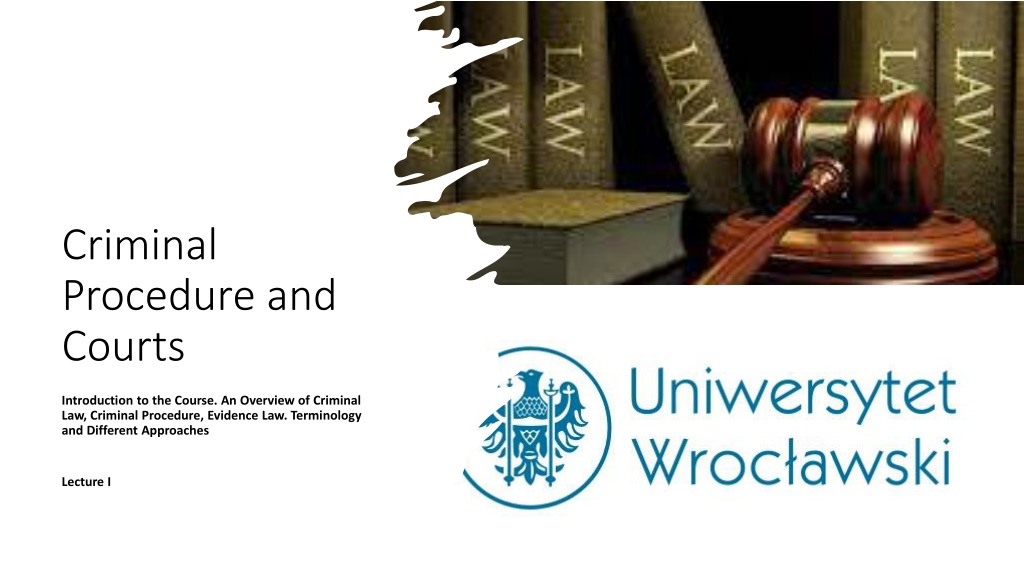

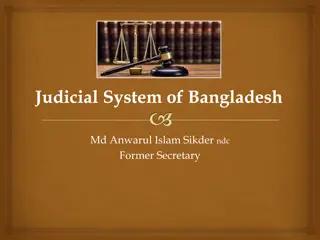


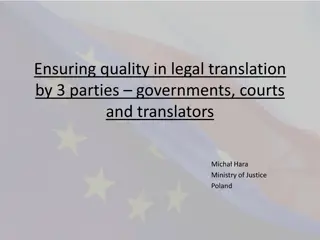
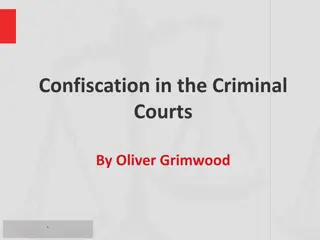

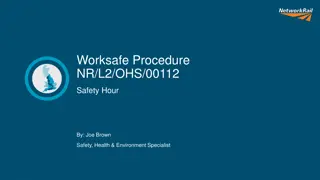
![Briefing on the Criminal Procedure Amendment Bill [B12-2021] to the Portfolio Committee on Justice and Correctional Services](/thumb/157093/briefing-on-the-criminal-procedure-amendment-bill-b12-2021-to-the-portfolio-committee-on-justice-and-correctional-services.jpg)

